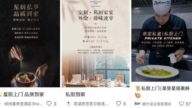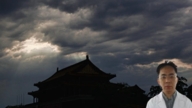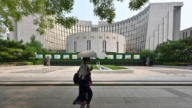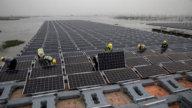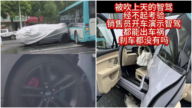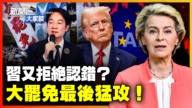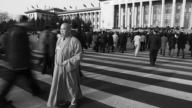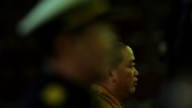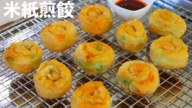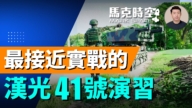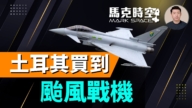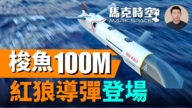【新唐人2013年01月30日讯】据中国大陆媒体报导,截至2012年末,全球新增货币供应量超过26万亿元人民币,中国占近一半,而中国货币投放量余额逼近亿万大关,位居世界第一,货币投放量与GDP的比例也再度创下历史新高。那么到底是什么原因导致中国货币泛滥呢?请看专家分析。
据《21世纪网》数据显示,2009年以来,中国央行的货币供应量,先后超过日本、美国、欧元区,成为目前全球最大的“印钞机”。 去年(2012年),全球新增货币供应量超过26万亿元人民币,中国占近一半。
另外根据大陆央行数据,截至2012年末,中国的货币投放量(M2)余额达到人民币97.42万亿元,居世界第一,接近全球货币供应总量的四分之一,是美国的1.5倍,比整个欧元区的货币供应量多出不只一个英国全年的供应量。
美国“南卡罗来纳大学艾肯商学院”教授谢田指出,中共出于对政权危机的恐惧,不去抗拒通货膨胀,而是以继续超发货币,保持经济畸形的增长,导致更大通货膨胀。
美国南卡罗来纳大学艾肯商学院教授谢田:“那从维护政权的角度看,维稳的角度看,失业人口的危害比通货膨胀的危害要更直接,更显眼,更明确,所以它基本上是在维护政治的角度,来增长GDP,来降低失业。”
“中国金融智库”研究员巩胜利指出,中国的国民生产总值是美国的1/3左右,而货币投放量是美国的4倍。
中国金融智库研究员巩胜利:“中国货币运行质量特别低,比如产出,投入一块钱,像美国可以产出3块甚至5块美金,中国投入一块钱只能产出0.3元美金。”
巩胜利进一步指出,中国货币运行质量低,有以下三点原因:一、中国财政除了负担正常国家的政府支出外,还要负担从少先队组织到党支部这个庞大的党组织支出,此外,妇联、工商协会、作家协会等一系列的行业协会,也要由国家负担﹔二、其他国家只有3级构架,而中国政府是7级构架,造成庞大的政府机构﹔另外,中国的各级官员喜欢把自己的亲朋好友塞进水、电、煤、气、土地等国营垄断企业,造成中国的能源成本特别高。
巩胜利:“湖南的邵阳这个地级市的水厂,按照正规,这么一个中等城市的水厂两、 三百人就行了,但是因为这个水厂是国有的,很多党政官员的子女全部往里塞,结果这个水厂超过了上千人,这些国有垄断型企业基本上都是这样,成本就必然高,钱从哪里来呢?只有多发货币了。”
巩胜利还说,因为中国不是市场经济,货币由党控制,货币发行量和增长度没有依据,同时又没有其他法治国家市场经济管理的方法,所以,中国的货币发行像“一锅粥”一样——乱。
巩胜利:“2012年上半年,很多地方货币不够用,包括国有企业,包括政府财政,那怎么办呢﹖只有发行货币,所以中国这锅乱粥,还得从源头——市场经济必备的规律上加以理顺,否则货币超发的唯一结果就是通货膨胀。”
谢田:“特权阶层的人士,他们总是能从超发的货币,从扩大规模的基础建设,从那些贷款……这些当中得到好处,他们的收入会远远超过通货膨胀的速度,这就是为什么我们说,超发货币是中国权贵掠夺中国人民财富最快捷、最无耻的一个方法。”
《21世纪经济报导》评论指出,随着2012年中国货币投放量(M2)余额逼近百万亿大关,全年GDP达到50万亿,而被用来度量一个国家货币超发程度的M2与GDP比例,再度创下历史新高,已经达到1.88倍。报导说,这是一个危险的信号。
采访编辑/刘惠 后制/钟元
China, The World’s Largest Money Printing Machine?
According to Chinese media, as of the end of 2012,
global new money supply surpassed RMB26 trillion, with China accounting for nearly half of it.
China’s M2 has reached 100 trillion, the highest in the world,
and set a record high again on the ratio of currency and GDP.
What is the reason for the proliferation of Chinese currency?
21st Century Network data show that since 2009,
money supply of China’s central bank has surpassed that of Japan, U.S., and the Eurozone.
China has become the world’s largest
money printing machine.
World’s new money supply in 2012 was over RMB26 trillion,
and nearly half of it was from China.
In addition, China’s central bank data shows that at the end
of 2012, the balance of China’s money supply (M2) reached RMB97.42 trillion, the highest in the world.
This was nearly a quarter of the total global money supply,
1.5 times of the U.S. supply, and surpassing that of the Eurozone and UK combined.
Professor Xie Tian from the University of South Carolina’
Aiken Business School commented on the issue.
Prof. Xie said, the Chinese Communist Party (CCP)
does not resist inflation, facing its regime crisis.
It continues to issue money to maintain the abnormal growth
of the economy, leading to greater inflation.
Prof. Xie: “From the perspective of maintaining power and
safeguarding stability, the dangers from the unemployed is more direct, more prominent and more obvious than inflation.
So it maintains power by high GDP
and reducing unemployment."
Researcher at China Finance Think-Tank, Gong Shengli
points out that China’s GDP is about 1/3 of the U.S.’, but its money supply is four times that of the U.S.
Gong Shengli: “The quality of Chinese currency operation
is very low. For example, in the U.S. $1 yields $3 – $5 in investments. In China, it only produces $0.3."
Gong Shengli further pointed out there are three main
reasons for the poor quality of the Chinese currency.
Firstly, China’s expenditure includes not only the normal
government expenses, but those of the huge CCP system too.
Starting from the Young Pioneers to the countless CCP
branches, plus the women’s unions, industry and commerce associations, the writers associations, etc.
Secondly, other countries only have three-level hierarchy,
while the Chinese government is a seven-layer hierarchy, resulting in huge governmental structure and expenses.
In addition, Chinese officials at all levels like to place
their family and friends in state monopolies, like water, electricity, coal, gas, land, etc. enterprises.
This results in particularly high energy costs in China.
Gong Shengli: “Hunan Shaoyang is a third level city.
Its water treatment plant should have about 200-300 people.
Since it is state-owned, officials’ children were put in there.
So this water place has over one thousand employees.
The same applies for all state-owned monopoly enterprises.
The cost is inevitably high.
Where do these money come from?
It can only issue new money."
Gong Shengli also said that China is not a market economy,
and its currency is controlled by the CCP.
There is no base for currency supply and growth.
It also does not have the management system
of a market economy like other countries ruled by a law.
Therefore, China’s currency is a mess.
Gong Shengli: “In the first half of 2012 many places
were short of money, including the local governments.
What could they do?
They have to issue money.
Chinese currency’ issue should be fixed based on the market
economy rules, otherwise it will only result in inflation."
Xie Tian: “The privileged class can always benefit by ultra-
issued currency, expanded scale of infrastructure and loans.
Their income will far exceed the pace of inflation.
That’s why we say ultra-issued currency is the fastest
and most shameless way to rob the Chinese people."
21st Century Business Herald comments that with China’s
money supply (M2) close to 100 trillion in 2012,
and annual GDP of 50 trillion, it has set another record
of M2 and GDP ratio, which measures currency supply.
The report said, this is a dangerous sign.


